Book Talk: What I Read in October
Guess who’s read 50 books this year? This writer. Seriously, I opened Goodreads this morning and saw the banner and that’s pretty cool actually. I’d initially set my target for forty-two books, aimed at reading a book a week, but I upgraded it to 62. So, pretty close. Next year, I’ll aim for 75.
Now, I’ll admit that this is pretty low for me. In the past, I’ve read upwards of a hundred books a year. In fact, during my teens—at one point in time—I read at least a book a day. But in my old age (of twenty-seven), between work and school now it seems, I have to actively block time to read books.
Especially since I’ve picked up a new hobby: knitting. Don’t ask, it’s weird. I’m weird. If you’re ever in Istanbul, and see a frazzled, bespeckled woman knitting a big purple monstrosity—well, that’s probably me.
Anyway, let’s move on to the crux of this blog: what I read in October.
October Breakdown: Book Recommendations
In case you haven’t read my September reading list yet, I highly recommend checking it out. I’ve mentioned this on a previous blog on writing murder mysteries too, but I really do enjoy reading thrillers in the fall. Unfortunately, fall’s practically over here in Istanbul. It’s cold, getting colder each day. And I LOVE reading darker, dystopian and historical fiction stories in the winter months.
And that’s basically what this month’s reading list shaped up to be. So, without further ado, here’s a list of what I read in October:
- Moscow X by David McCloskey
- The Women of Arlington Hall by Jane Healey
- Sharp Objects by Gillian Flynn
- The Girl With the Dragon Tattoo by Stieg Larsson
- 1984 by George Orwell
Book 1: Moscow X
- Author: David McCloskey
- Genre: Spy Thriller
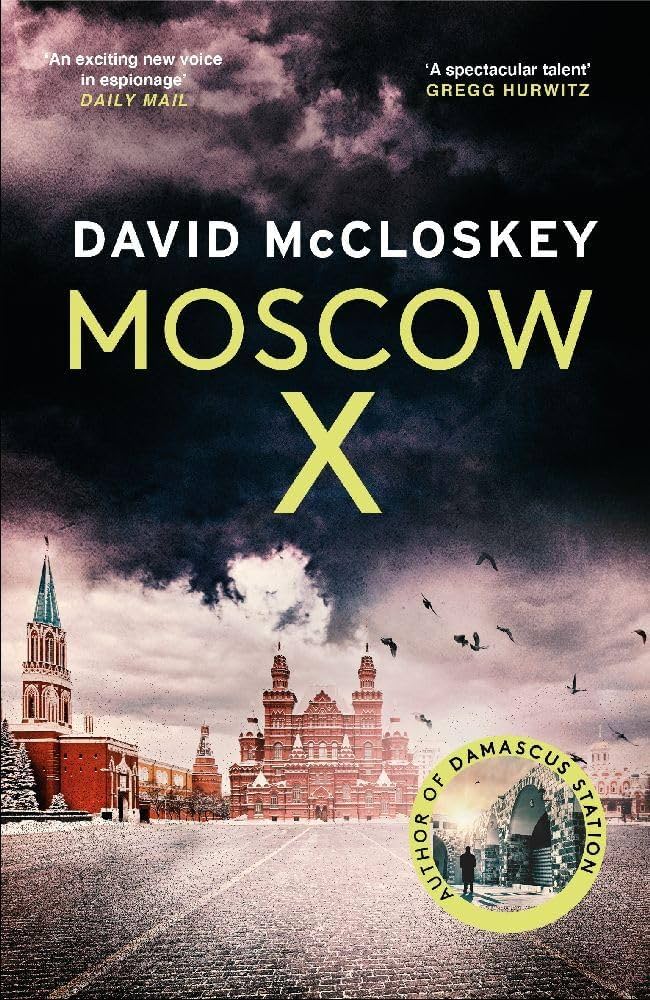
Why I Picked It Up
This one was actually recommended to me by Goodreads because I’ve read Red Sparrow in the past. And spy thrillers are my cup of tea, so I was sold immediately. I just looked at the review, read the blurb and I was in.
Summary
CIA officers Sia and Max pose as a couple to recruit Putin’s private banker and his wife Anna—a secret Russian intelligence officer herself. As they navigate luxury, violence, and layers of deception across Russia and Mexico, their operation spirals into something far more dangerous than anyone anticipated.
What I Liked
McCloskey is a former CIA analyst, and it shows. This story feels authentic without being boring or overly technical. He strikes that perfect balance where you feel like you’re getting insider knowledge without needing a glossary. The way he captures the world of Russian oligarchs and Putin’s inner circle is genuinely fascinating. You get this sense of how interconnected and corrupt everything is at the top.
The character development in this book is really strong too. Sia is this adrenaline junkie lawyer who thrives in the shadows, and Max comes from a family of generational CIA assets running a horse breeding operation in Mexico. Their dynamic works really well, especially because they’re both flawed and complicated in ways that feel real rather than manufactured for drama.
I loved how McCloskey weaves between multiple locations—the horse ranch in Mexico, CIA headquarters in Langley, and the dark opulence of Putin’s Russia. Each setting feels distinct and atmospheric. The pacing builds steadily, and once things start moving, they really move. The layers of deception and double-crosses kept me guessing throughout.
Downsides
This isn’t a book that flies out of the gate. If you’re expecting non-stop action from page one, you’ll be disappointed. McCloskey takes his time setting up the characters and their backstories, which I personally didn’t mind but I can see it being slow for some readers. The first third is very much setup and world-building.
Some plot developments rely on conveniences that made me raise an eyebrow. Nothing completely unbelievable, but the kind of thing where you go “that’s awfully convenient” before moving on because you’re invested. Also, there are a lot of moving parts and characters to keep track of, so if you’re not paying attention, you might get a bit lost.
Final Thoughts & Who Should Read It
Moscow X is one of those rare spy thrillers that feels both entertaining and authentic. If you loved Red Sparrow or Jason Matthews’ work, this is absolutely for you. Fans of John le Carré’s slow-burn espionage will also appreciate McCloskey’s approach to the genre.
Book 2: The Women of Arlington Hall
- Author: Jane Healey
- Genre: Historical Fiction
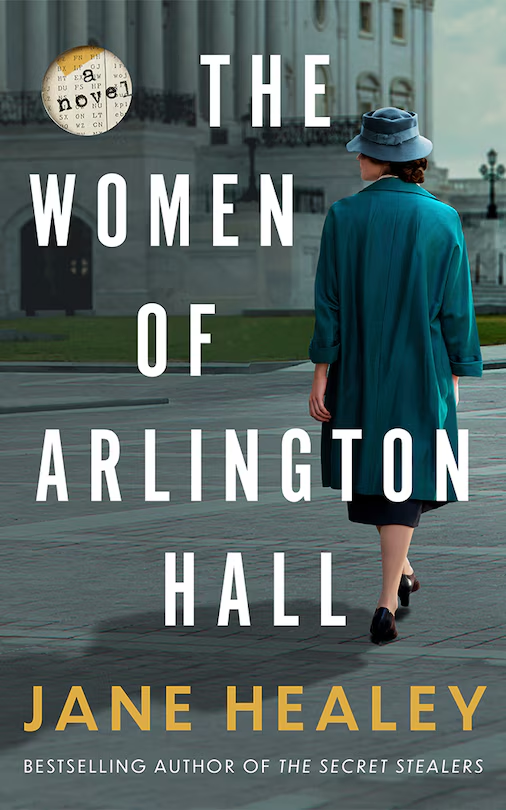
Why I Picked It Up
I actually recently watched Traitors on Netflix, and it got me wondering if there were any books about the role of women during the War World II/Cold War era. I started looking but I couldn’t find anything that was less romance (I mean, I’m all for it but can we not have the espionage as a background but an active plot please?) and more spy thriller.
So, imagine my surprise when I picked this book up, thinking it’s just a well-written romance against the cold war backdrop, and found out that it was actually the exact blend of romance, thriller I was looking for. Never judge a book by its cover, that’s the moral of this one.
Summary
In 1947, Radcliffe graduate Catherine “Cat” Killeen cancels her wedding to join the top-secret Venona Project at Arlington Hall, working to decrypt Soviet communications and track down Russian spies. She reunites with her Harvard rival Jonathan Dardis, now an FBI agent, and together they navigate Cold War espionage while their competitive attraction turns into something more dangerous.
What I Liked
This book surprised me in the best way. The historical detail is impeccable without feeling like a history lesson. Healey clearly did her research on the Venona Project and Arlington Hall, and it shows in how authentic everything feels. The codebreaking elements are fascinating, and I loved learning about this piece of Cold War history that doesn’t get talked about enough.
Cat is a fantastic protagonist. She’s brilliant, ambitious, and refuses to let societal expectations dictate her life. The fact that she cancels her wedding to pursue cryptanalysis work in 1947 tells you everything you need to know about her character. The female friendships in this book are also incredibly well done—the camaraderie between the “government girls” at Arlington Hall feels genuine and supportive.
The romance between Cat and Jonathan works surprisingly well. Their rivals-to-lovers dynamic is entertaining, and the tension between personal desire and professional duty adds real stakes to their relationship. Healey balances the romance with the espionage elements better than I expected. Real historical figures like J. Edgar Hoover, Klaus Fuchs, and Julius and Ethel Rosenberg make appearances, which grounds the story in actual events.
The pacing is tight, and once things start moving, they really move. The suspense builds naturally as Cat gets deeper into tracking Soviet spies, and there are genuine moments of danger that had me turning pages faster than I should’ve.
Downsides
Here’s where things get tricky. Some readers might find the romance overshadows the codebreaking aspects at times. If you’re expecting a super technical deep dive into cryptanalysis, you’ll be disappointed. The book is more focused on the people doing the work than the technical details of the work itself.
The romance, while enjoyable, can feel a bit predictable if you’ve read any enemies-to-lovers stories before. You can see where it’s going pretty early on. Also, Cat and her colleagues discuss their classified work in public spaces—bars, restaurants—which felt a bit unrealistic given how secretive these operations were supposed to be.
Final Thoughts & Who Should Read It
Despite some predictable romance beats, this is a solid historical fiction that shines a light on women whose contributions have been overlooked. If you enjoyed Code Name Verity or The Rose Code, you’ll appreciate this one. Perfect for readers who want a mix of romance, female friendship, and Cold War intrigue without getting bogged down in heavy technical details.
Book 3: Sharp Objects
- Author: Gillian Flynn
- Genre: Thriller, Mystery
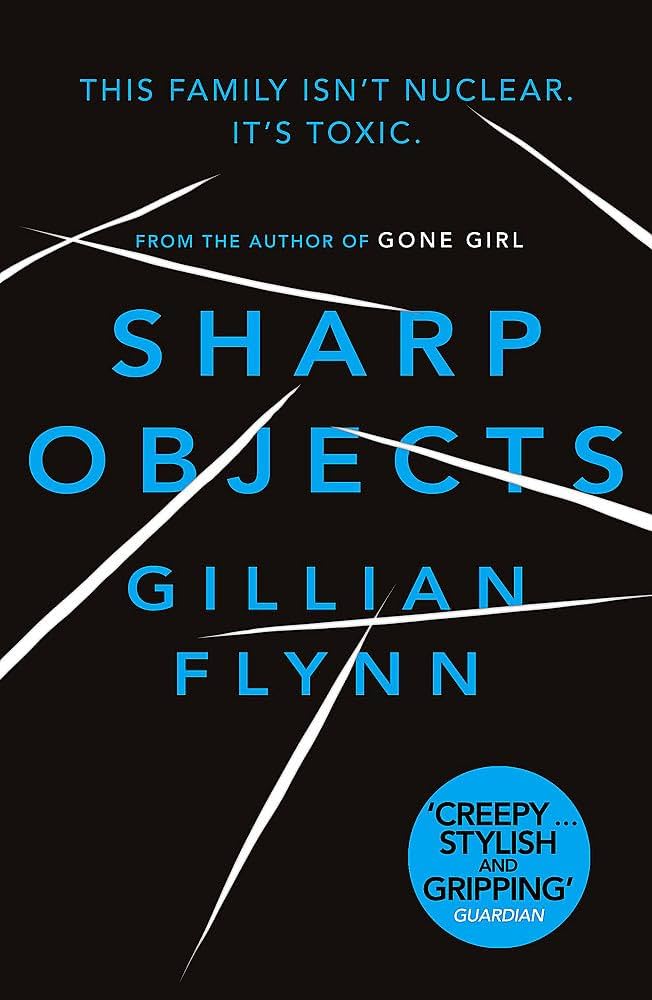
Why I Picked It Up
Not sure if I’ve mentioned this before but I’ve both read and watched Gone Girl several times over the years. Interestingly, as I’ve gotten older, I’ve started to like this book even more, and Gillian Flynn’s a great writer. But after The Women of Arlington Hall, I wanted something darker and more psychological. I kept seeing Sharp Objects mentioned as Flynn’s best work—apparently even better than Gone Girl—so I figuredI I’d give it a shot.
Summary
Crime reporter Camille Preaker returns to her claustrophobic Missouri hometown to cover the murders of two young girls. Forced to stay in her mother’s Victorian mansion, she reconnects with her neurotic, controlling mother and her unsettling thirteen-year-old half-sister Amma. As Camille investigates the killings, she’s haunted by her own dark past and destructive coping mechanisms, including a history of self-harm that has left her body covered in scars.
What I Liked
This book is genuinely disturbing in the best possible way. Flynn doesn’t pull any punches—the darkness is relentless and suffocating. The small-town setting of Wind Gap feels authentically creepy, like everyone’s hiding something and no one is quite sane. The atmosphere is oppressive and claustrophobic, which perfectly mirrors Camille’s mental state as she’s forced back into her childhood home.
Camille is a deeply flawed protagonist, dealing with self-harm, alcoholism, and unresolved trauma. She’s not likable in the traditional sense, but she feels real and raw in a way that’s hard to look away from. Her mother Adora is terrifying—this twisted portrayal of motherhood that challenges everything we associate with maternal care. The way Flynn handles Munchausen syndrome by proxy is both fascinating and horrifying.
And Amma? Probably the most unsettling character in the entire book. She’s this precocious thirteen-year-old with an unnatural grip on the town, and there’s something deeply wrong about her that you can’t quite put your finger on until it’s too late. Flynn’s characterization is brilliant because every character feels deliberately off, like they’re all performing versions of themselves.
The writing itself is sharp and effective. Flynn doesn’t waste words, and the pacing builds steadily even if it starts slow. The psychological complexity here is what really sets it apart from standard thrillers. This isn’t just about solving murders—it’s about generational trauma, dysfunctional family dynamics, and how people inflict lasting damage on those they’re supposed to love.
Downsides
This is definitely a slow burn. If you’re expecting Gone Girl-level plot twists and rapid pacing from page one, you’ll be disappointed. The first third is very much set up, focusing on Camille’s internal struggles and family dynamics more than the actual murder investigation.
Some readers will find this frustrating, especially if you’re looking for a traditional whodunit.
The ending is handled oddly. The final revelations are delivered through Camille recounting what happened rather than showing it in real-time, which feels rushed and anticlimactic after all that buildup. It’s a “tell, not show” situation that would’ve been much stronger if we’d experienced those revelations alongside Camille.
Also, this book is heavy. Like, genuinely disturbing and emotionally draining. The themes of self-harm, child abuse, and psychological manipulation are relentless. If you’re sensitive to any of these topics or not in the right headspace, this one will wreck you. It’s not cozy mystery vibes—this is bleak and unsettling throughout.
Final Thoughts & Who Should Read It
Sharp Objects is dark, twisted, and uncomfortable in all the right ways, even if the ending doesn’t quite stick with the landing. If you loved The Girl on the Train or In the Woods, this delivers that same unreliable narrator energy with even more psychological depth.
Book 4: The Girl With the Dragon Tattoo
- Author: Stieg Larsson
- Genre: Thriller, Mystery
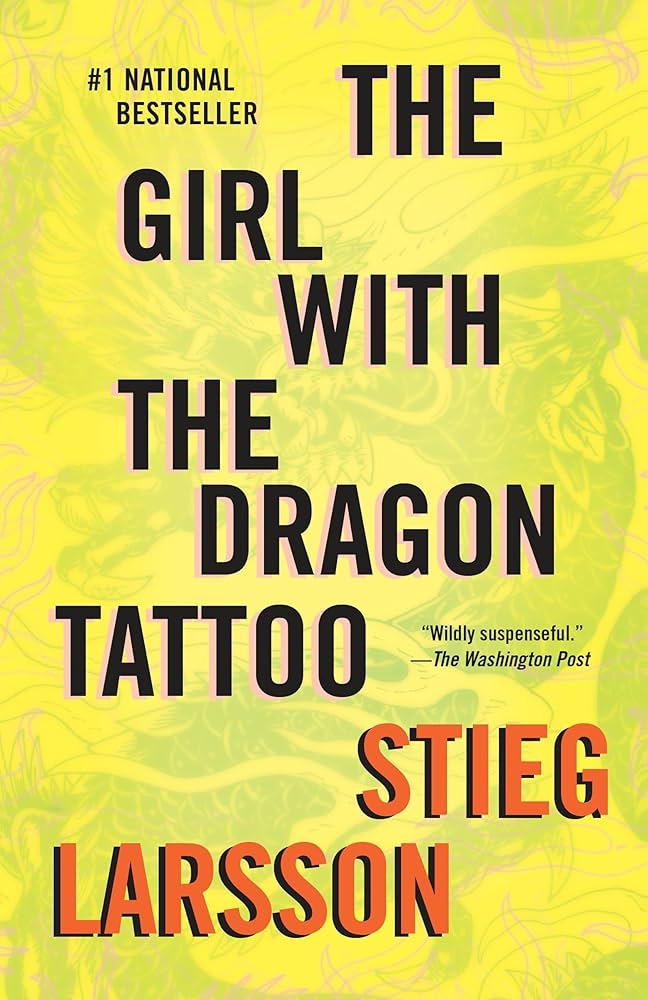
Why I Picked It Up
After Sharp Objects left me emotionally wrecked, I needed something equally dark but different. I’d first read about The Girl With the Dragon Tattoo in a newspaper review in my early teens but I’d never really gotten a chance to actually read it. I kept seeing it mentioned alongside other thrillers I loved, and the premise of a decades-old cold case mystery sounded right up my alley. Plus, Sweden seemed like a good change of pace.
Summary
Disgraced journalist Mikael Blomkvist is hired by wealthy industrialist Henrik Vanger to investigate the forty-year-old disappearance of his niece Harriet from the family’s isolated island. Blomkvist teams up with Lisbeth Salander, a brilliant but antisocial hacker with a photographic memory and a dragon tattoo, to unravel decades of family secrets, corruption, and violence hidden within the powerful Vanger dynasty.
What I Liked
Lisbeth Salander is genuinely one of the most compelling characters I’ve encountered in crime fiction. She’s this punk hacker with photographic memory, covered in tattoos and piercings, who exists completely outside societal norms. What makes her fascinating isn’t just her unconventional appearance—it’s her intelligence, her resilience despite a horrific past, and the way Larsson writes her thought processes. You can tell he really understood what he was creating with her character.
The cold case mystery itself is meticulously plotted. Larsson takes his time building the Vanger family history, and while it’s slow at first, the payoff is worth it. The way Blomkvist pieces together clues from old photographs, family records, and interviews feels authentic to investigative journalism. It’s methodical detective work rather than convenient plot twists, which I appreciated.
The Swedish setting adds this atmospheric bleakness that works perfectly for the story. The isolated island where the Vangers live creates this claustrophobic tension, and Larsson captures the darkness lurking beneath Sweden’s reputation as a progressive, egalitarian society. The original Swedish title is “Men Who Hate Women,” and that’s really what this book is about—exposing violence against women and systematic corruption.
I also loved the dynamic between Blomkvist and Salander. They’re this odd couple who complement each other—his journalistic methodology paired with her hacking skills and unconventional approach. Their partnership feels genuine rather than forced.
Downsides
The first 100 pages or so are slow. Larsson spends a lot of time on financial journalism details and setting up the Wennerström subplot, which can feel tedious if you’re expecting immediate mystery action. Some readers will bounce off this pacing entirely, and I wouldn’t blame them.
Larsson also has a tendency to over-explain things. He’ll describe exactly what Lisbeth is wearing down to the specific band on her t-shirt, or give you detailed specs about computer equipment that don’t really matter to the plot. It feels like he’s trying too hard to establish her as this edgy counterculture figure when her actions already do that perfectly well. Show, don’t tell, you know?
The violence and sexual assault in this book are graphic and disturbing. Larsson doesn’t shy away from depicting brutal misogyny, which is central to his point, but it’s genuinely difficult to read at times. This isn’t a book you pick up for light entertainment—it’s heavy and dark throughout.
Also, the ending feels a bit unresolved. The Harriet Vanger mystery wraps up, but there are lingering plot threads that clearly set up the sequels. If you’re looking for complete closure in one book, you might be frustrated.
Final Thoughts & Who Should Read It
Despite the slow start and occasional over-writing, this is a masterfully plotted thriller with an unforgettable protagonist. If you loved Gone Girl or The Silence of the Lambs, this delivers that same dark, psychological intensity with even more social commentary. Perfect for readers who appreciate complex mysteries and don’t mind dense, methodical pacing in service of a bigger payoff.
Book 5: 1984
- Author: George Orwell
- Genre: Classic, Dystopia
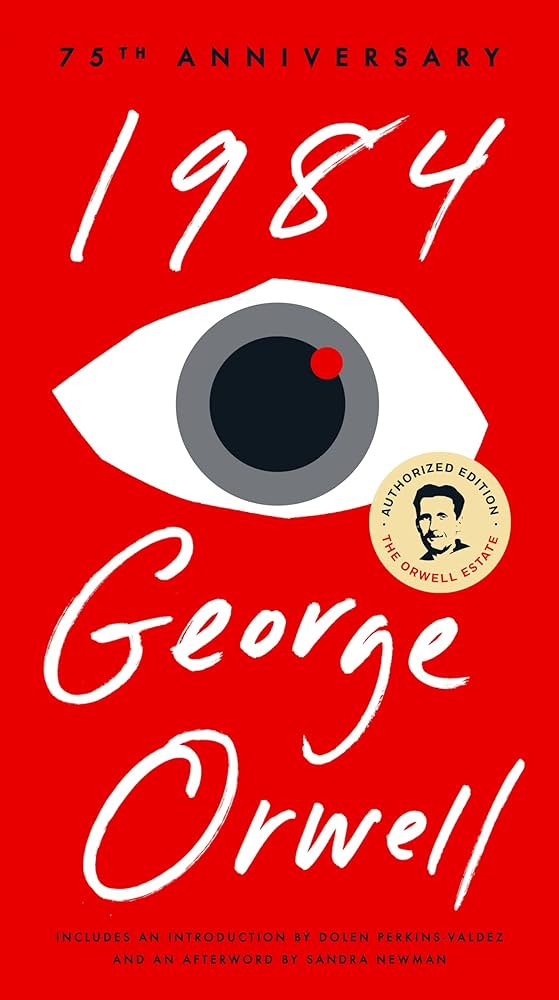
Why I Picked It Up
If you’ve read my writing blogs, you’ve probably figured out that I LOVE 1984. Seriously, George Orwell is one of my favourite writers of all time, second only to Paulo Coelho. And let’s be honest, given the state of the world, this book oddly helps ground me.
I’m writing this blog a day after Mamdani’s win as New York City Mayor. And the way people are behaving, it’s just disturbing. I picked up 1984 in late October because the world was getting too much for me right now. Of course, it’s gotten worse. But yeah.
If anything, it’s making me write my manuscript because my story is inspired by both 1984 and Brave New World.
Weirdly enough, this calmed me down. Because even though things are bad, at least it’s not 1984 bad—and yeah, the bar’s under the floor at this point, but I needed this. I’m currently re-reading Brave New World again too so that’ll be in next month’s reading list.
Summary
Winston Smith lives in Oceania, a totalitarian superstate ruled by the Party and its enigmatic leader Big Brother. Working at the Ministry of Truth rewriting history to fit Party propaganda, Winston secretly rebels against the oppressive regime through his forbidden diary and a dangerous love affair with Julia. As thought crimes are punishable by torture and “vaporization,” Winston’s quest for truth and freedom leads him into the Ministry of Love, where the cost of resistance becomes devastatingly clear.
What I Liked
Orwell’s vision is terrifyingly prescient. The constant surveillance through telescreens, the rewriting of history, the manipulation of language through Newspeak, the Two Minutes Hate ritual—it all feels uncomfortably relevant today. The parallels to our modern world of social media, government surveillance, and information manipulation are impossible to ignore. It’s genuinely unsettling how much of this dystopian nightmare from 1949 feels like commentary on 2025.
The political commentary is sharp and uncompromising. Orwell wrote this as a warning against totalitarianism, specifically responding to Stalinist Russia, but the themes are universal. The way the Party controls reality itself—”2+2=5 if the Party says so”—is a brilliant exploration of how authoritarian regimes operate. The concept of doublethink, where people simultaneously hold contradictory beliefs, is both fascinating and horrifying.
The worldbuilding is meticulous. Orwell takes his time establishing how this society functions, from the perpetual war between superstates to the rigid class system of Inner Party, Outer Party, and proles. The way children are trained to spy on their parents, the rationing, the propaganda—every detail adds to this suffocating atmosphere of control and paranoia.
The ending is brutal and perfect. No spoilers, but this isn’t a book where love conquers all or rebellion succeeds. It’s bleak and hopeless in a way that drives home Orwell’s point about the dangers of unchecked governmental power. That final section in the Ministry of Love is genuinely disturbing and will stay with you.
Downsides
As someone who adores this book, I can’t find any downsides to it except that it might seem a bit slow. But here’s the thing about the pacing, it picks up. And gosh, I love how Orwell does it. Seriously. For future readers of my book series, this is the blueprint, and I’ll give you a major spoiler for my own series. Let’s see if you can figure it out.
Readers might find Winston as extremely bland, but this is deliberate. He’s meant to represent everyman under totalitarianism, making him less engaging than you might want. I understood why Orwell wrote him this way, but there were moments where I wished for more personality. But let’s be honest: you’re not reading 1984 for Winston. You’re reading it because of its worldbuilding.
This isn’t a fun read. It’s important, thought-provoking, and brilliant. There’s a love story, but it’s doomed from the start. If you’re looking for hope or escapism, look elsewhere. But if you’re like me, read it.
Final Thoughts & Who Should Read It
If you enjoyed Brave New World or The Handmaid’s Tale, this delivers that same dystopian warning with even more political bite. Perfect for anyone interested in political philosophy, surveillance culture, or understanding where phrases like “Big Brother” and “thoughtcrime” originated.
What I Read in October: Summary & Favourite (and Least Favorite) Book
October turned into an unexpectedly intense reading month that I wasn’t quite prepared for. I went in thinking I’d stick to my usual mystery and thriller rotation, but somehow ended up on this wild journey from spy thrillers to Cold War codebreakers to psychological horror to dystopian nightmares. Looking back at the list, I’m not entirely sure how I got here, but I’m not complaining.
What’s interesting is how different each book felt despite all of them being dark in their own way. Moscow X was sleek and sophisticated, The Women of Arlington Hall balanced romance with espionage, Sharp Objects was intimate and disturbing, The Girl with the Dragon Tattoo was methodical and complex, and 1984 was just… bleak.
If I had to pick a favorite, it’s definitely Moscow X. I don’t count 1984, because it was a re-read and to be honest, Moscow X was really good—I liked it immediately.
As for my least favorite, I’m going with The Women of Arlington Hall. It was enjoyable and well-researched, but it leaned more heavily into romance than I expected. Not a bad thing necessarily, just different from what I was hoping for when I picked it up.
October was definitely heavier than September’s reading list, and I’m still processing some of these books (looking at you, Sharp Objects). But that’s what makes a good reading month, right? When the books stay with you long after you’ve finished them, for better or worse.
What did you think of my picks? Let me know in the comments!





2 Comments
Candice Tank
Thank you!
Tess Meyoz
Good reading list. I like spy noir and thrillers too!